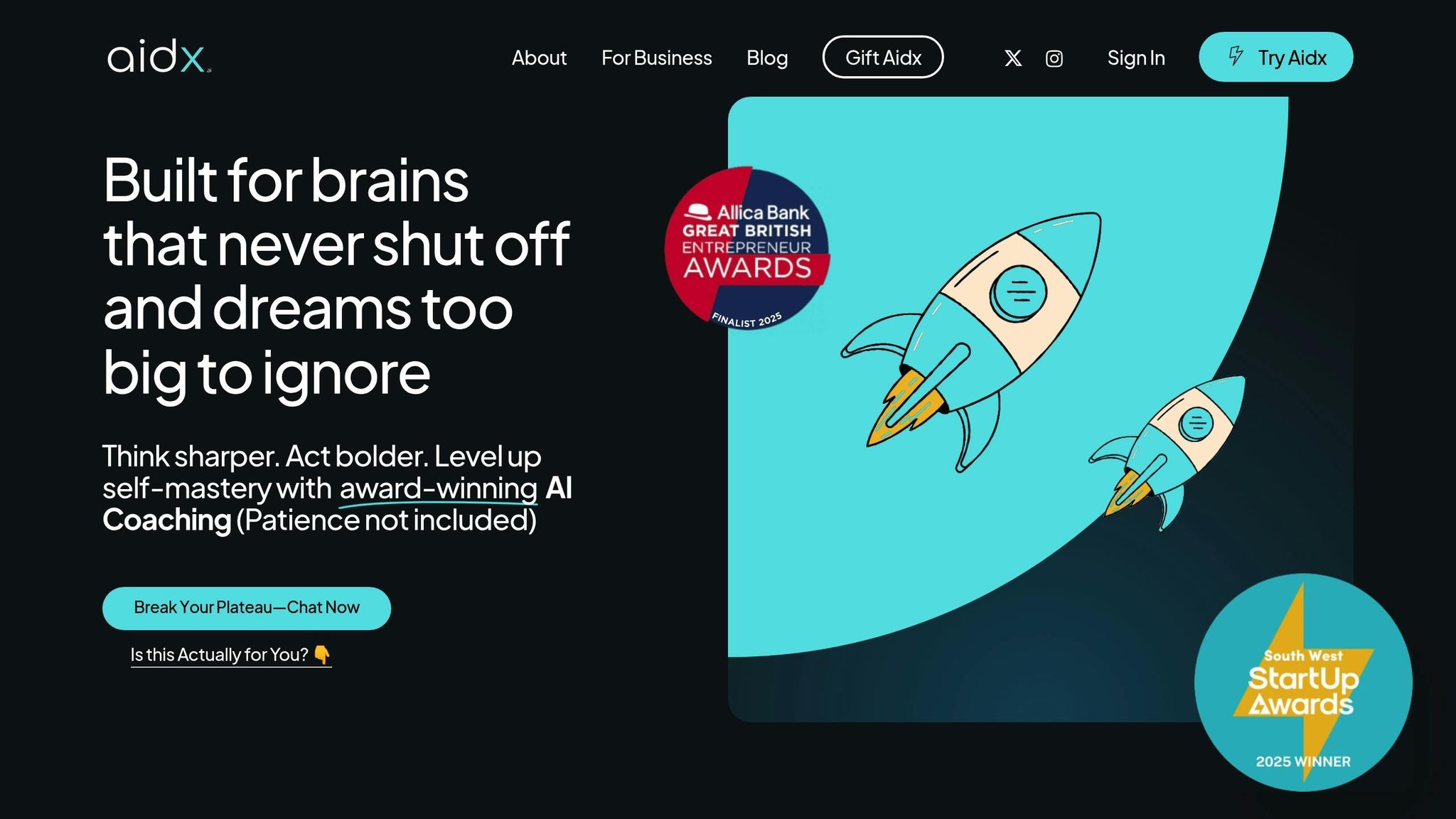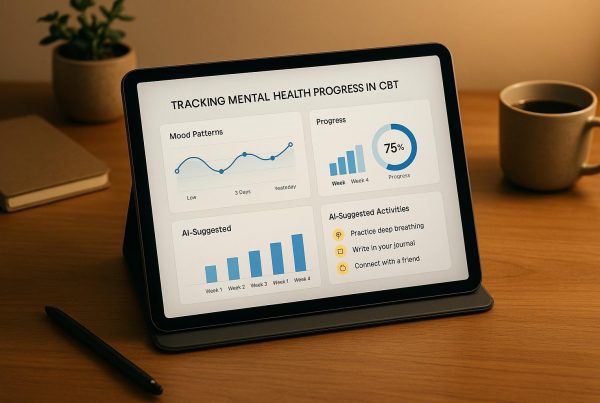AI emotion feedback systems are changing how people approach coaching by offering real-time emotional analysis and support. These systems, like Aidx.ai, are designed to help users achieve goals faster by providing immediate feedback, personalized strategies, and 24/7 availability. While human coaches excel at building emotional connections and understanding complex feelings, AI systems bring consistency, accessibility, and cost-effectiveness to the table.
Key Takeaways:
- AI Strengths: Instant feedback, scalable support, and improved self-awareness (20% increase compared to 10% with human coaching).
- Human Coaching Strengths: Emotional depth, empathy, and stronger motivation.
- Challenges: AI struggles with nuanced emotions, while human coaching is limited by availability and higher costs.
- Best Approach: A hybrid model combining AI for daily support and human coaching for deeper emotional work offers the most effective results.
Quick Comparison:
| Aspect | AI Systems | Human Coaching |
|---|---|---|
| Availability | 24/7 | Scheduled sessions |
| Emotional Connection | Limited | Strong |
| Cost | Lower | Higher |
| Feedback Timing | Instant | Delayed |
| Personalization | Data-driven, consistent | Emotionally intuitive |
| Privacy Comfort | High for sensitive topics | Dependent on client comfort |
The future lies in combining these two approaches to maximize goal achievement and personal growth.
I Built an AI Coach with Hume AI That Reads Emotions! (n8n & telegram)
1. Aidx.ai

Aidx.ai is breaking new ground in AI-driven emotion feedback, specifically designed for goal-oriented coaching. Recognized as the AI Startup of the Year by the UK Startup Awards in both 2024 and 2025, this voice-enabled platform uses its ATI System™ to deliver intelligent, real-time coaching. Unlike standard AI chatbots, Aidx.ai blends therapeutic expertise with practical tools for achieving goals, creating a deeply personalized coaching experience that adapts to each user’s emotional patterns and communication style. Below, we’ll explore how Aidx.ai’s standout features support effective, goal-focused coaching.
Feedback Timing
Aidx.ai stands out by offering immediate, actionable emotion feedback through its voice-enabled interface. This quick response allows users to make timely adjustments to their mindset and behavior, speeding up progress toward their goals. Whether it’s preparing for a big presentation, managing a tough conversation, or facing a difficult decision, this real-time feedback proves invaluable.
Research shows that AI-powered emotion coaching systems can lead to faster skill development, with users often seeing improvements in just two weeks compared to the four weeks typically needed with traditional methods [2]. The platform’s 24/7 availability eliminates the delays common in traditional coaching, enabling users to practice emotional regulation skills in the moment, as real-life situations unfold.
The system’s ability to provide instant feedback ensures users can address challenges and emotions as they arise. This not only boosts engagement but also fosters more effective behavior changes. Over time, users develop the habit of performing daily emotional check-ins, especially during stressful periods, reinforcing their progress when it matters most.
Personalization
The ATI System™ at the heart of Aidx.ai uses evidence-based techniques – like CBT, DBT, ACT, and NLP – to create a tailored coaching experience for every user. By analyzing each person’s unique emotional and communication patterns, the platform adapts its approach dynamically, applying the most relevant strategies for individual needs.
Studies reveal that participants coached by AI experience a 20% increase in self-awareness, compared to just 10% with traditional training. Similarly, empathy development improves by 17% with AI coaching, versus 11% for conventional methods [2]. The system’s ability to ask the right questions and adjust strategies as users grow ensures that coaching remains relevant, even as new challenges arise.
Aidx.ai also offers three specialized modes to suit different goals:
- Life Mode: Focused on personal growth and mental wellness.
- Business Mode: Tailored for leadership and professional development.
- Performance Mode: Designed for optimizing peak performance.
Each mode applies the same personalized techniques but focuses on the specific challenges and outcomes relevant to its domain.
Integration with Daily Life
Aidx.ai’s voice-enabled interface and multi-platform access make it easy to incorporate coaching into everyday routines. Users can set goals, receive reminders, and track their progress with integrated planning tools. The platform’s notification system sends reminders via push notifications and email, while self-monitoring tools help users measure progress across various metrics like confidence, stress, anxiety, and overall performance.
AI-coached users report 30% higher engagement rates compared to traditional methods, with more frequent interactions with the system [2]. This continuous availability ensures that users can practice emotional intelligence skills during life’s in-between moments, offering support when traditional coaching isn’t an option.
Privacy
Aidx.ai takes privacy seriously. It encrypts all user data, complies with GDPR, and ensures no human oversight unless legally required. Additionally, its incognito mode automatically clears session data after 30 minutes of inactivity, giving users the freedom to explore sensitive topics and emotions without worry [2].
Unlike other platforms that may store or review user data for quality control, Aidx.ai guarantees that conversations remain private unless required by law. This strong commitment to confidentiality fosters trust, allowing users to fully engage in their coaching sessions and address deeper emotional challenges that lead to meaningful progress.
2. Standard Coaching Tools
Traditional coaching relies on human expertise and structured sessions to guide personal development. While these methods offer some clear advantages, they also come with limitations, particularly when it comes to delivering timely and effective emotional feedback in goal-oriented coaching.
Feedback Timing
One of the biggest challenges with traditional coaching is the fixed schedule – sessions typically occur weekly or monthly. This means there’s often a significant delay between the moment a client experiences an emotional challenge and when they can discuss it with their coach. For instance, a client might face a stressful situation on Monday but have to wait until their Thursday session to address it. By then, the moment has passed, and the opportunity for immediate, impactful guidance is lost.
Studies comparing coaching methods highlight timing differences. For example, stress reduction was reported in 55% of face-to-face coaching sessions, compared to 45% for AI-assisted sessions [3]. However, human coaches often lack availability during off-hours, such as weekends or late nights. This limitation can leave clients without support during critical moments of need, a gap that real-time tools like Aidx.ai aim to address.
The reliance on scheduled sessions also means clients must recall past events and emotions, which can fade over time. This weakens the effectiveness of feedback and contrasts sharply with the instant responsiveness offered by AI-driven systems.
Personalization
Traditional coaching excels at personalization, with human coaches tailoring their approach based on the client’s personality, goals, and emotional state. Coaches rely on real-time signals like body language, tone of voice, and emotional expressions to adapt their communication and feedback strategies. This ability to connect on an emotional level was noted by 27 respondents in human sessions versus 15 in AI-assisted ones [3].
However, this strength also has its challenges. Coaches often juggle multiple clients, making it difficult to recall subtle details from previous sessions. Factors like a coach’s mood, energy levels, or personal biases can also affect the quality and consistency of feedback. While human coaches bring a unique depth to their sessions, these variables can introduce inconsistencies that AI systems – designed for precision and memory – can avoid.
Integration with Daily Life
Another limitation of traditional coaching lies in its separation from daily life. Sessions require clients to step away from their routines, whether for in-person meetings or video calls. While these sessions can provide valuable insights, applying those lessons in real-life situations often proves challenging.
Between sessions, clients are typically left to implement advice on their own. Coaches may provide tools like worksheets or homework, but these often feel disconnected from the client’s day-to-day activities. For example, a client might gain helpful advice during a Tuesday session yet struggle to recall or apply it during a high-pressure moment later in the week.
This session-based model creates gaps in support during the moments that matter most – when emotions run high, and decision-making becomes difficult. Without immediate guidance, clients are left to navigate these situations alone until their next scheduled appointment.
Privacy
Privacy is another area where traditional coaching tools have strengths and challenges. Professional codes of ethics, such as those enforced by the International Coaching Federation (ICF), ensure strong confidentiality protections. These standards help maintain trust and safeguard client information.
However, privacy concerns go beyond legal guarantees. Some clients may feel uncomfortable sharing deeply personal issues face-to-face, even with a trusted coach. The human element, while valuable for connection, can sometimes act as a barrier for those who prefer to process their emotions privately before discussing them.
Interestingly, clients reported high stress levels after sessions with AI-assisted tools twice as often as after sessions with human coaches [3]. However, this doesn’t necessarily mean human coaching is always better. In face-to-face sessions, some clients may feel pressure to present themselves in a certain way, potentially limiting honest self-reflection and emotional exploration.
Additionally, the way human coaches handle session notes can vary widely. While most adhere to professional standards, inconsistencies in documentation practices and storage security can raise concerns. These challenges highlight areas where traditional methods fall short compared to the continuous, secure support offered by AI-based systems.
sbb-itb-d5e73b4
Pros and Cons
When deciding between AI emotion feedback systems and traditional coaching tools, it’s essential to weigh their strengths and limitations. Below is a side-by-side comparison to help you understand how each option stacks up.
| Aspect | AI Emotion Feedback Systems | Traditional Coaching Tools |
|---|---|---|
| Availability | Accessible 24/7 for real-time support during critical moments | Limited to scheduled sessions, often weekly or monthly |
| Consistency | Provides uniform feedback without mood variations | Feedback quality can vary based on the coach’s energy, mood, or other personal factors |
| Emotional Intelligence | 15% improvement in emotional intelligence[2] | 8% average increase in emotional intelligence scores[2] |
| Self-Awareness | 20% improvement via real-time feedback[2] | 10% improvement in self-awareness[2] |
| Self-Regulation | 18% boost in self-regulation skills[2] | 9% improvement in self-regulation abilities[2] |
| Cost Structure | More affordable, making coaching accessible to a broader audience | Higher costs due to one-on-one human interaction |
| Scalability | Can support unlimited clients simultaneously | Limited by the availability of individual practitioners |
| Human Connection | Lacks genuine emotional intelligence and empathy | Provides irreplaceable human empathy and emotional connection[2] |
| Complex Emotions | Struggles with nuanced or mixed emotions, with occasional misinterpretations[2] | Excels at detecting subtle and complex emotional states |
| Privacy Comfort | Offers professional confidentiality, though some may find AI interactions less intimidating | Some users feel uneasy sharing personal feelings with AI[2] |
Where AI Systems Shine
AI emotion feedback systems excel in objectivity and consistency. Unlike human coaches, AI doesn’t bring personal biases or mood fluctuations into the equation. This makes it a great tool for tracking progress and providing actionable feedback over time. For example, platforms like Aidx.ai use the Adaptive Therapeutic Intelligence (ATI) System™, which learns an individual’s communication style and emotional patterns to offer increasingly tailored experiences.
Another standout feature is real-time availability. AI systems are there when you need them most – especially during high-stress situations. Instead of waiting days or weeks for a scheduled session, users can receive immediate feedback and apply coping strategies in the moment. This immediacy can significantly enhance self-regulation, as seen with Aidx.ai’s ability to deliver rapid insights.
The Strengths of Traditional Coaching
Human coaches bring something AI cannot: authentic empathy. They build trust and create a safe space for meaningful conversations. Coaches excel at picking up on subtle cues – body language, tone of voice, and emotional nuances – that AI often misses or misinterprets.
Additionally, human coaches provide accountability and motivation. They challenge limiting beliefs, encourage creative problem-solving, and offer emotional support that only a real human connection can provide. While AI systems like Aidx.ai are consistent and reliable, human coaches foster deep emotional engagement that many clients value.
Key Challenges to Keep in Mind
AI systems, despite their strengths, have limitations. For instance, some users may develop emotional dependency on AI, relying too heavily on it for validation rather than building independent self-regulation skills[2]. AI also struggles to interpret complex or nuanced emotions, areas where human coaches naturally excel.
On the other hand, traditional coaching has its own hurdles. Timing gaps – due to fixed schedules – can mean missed opportunities for immediate intervention during critical emotional moments. Additionally, cost barriers often make one-on-one coaching inaccessible to many who could benefit from it.
The Case for a Hybrid Approach
A hybrid model offers the best of both worlds by combining AI’s strengths in real-time support and pattern recognition with the emotional depth and nuanced understanding of human coaches. Using AI for daily check-ins and immediate feedback, while reserving human coaching for deeper emotional work and complex issues, creates a balanced and effective approach to goal-oriented coaching.
Conclusion
Our earlier analysis highlights the strengths and limitations of AI emotion feedback systems and traditional coaching tools, showing that their effectiveness often depends on individual preferences and specific circumstances.
AI emotion feedback systems shine when consistency and accessibility are priorities. These tools provide instant, unbiased feedback, free from the influence of human mood or bias. For example, Aidx.ai’s Adaptive Therapeutic Intelligence (ATI) System™ is designed to adapt to individual communication styles, offering personalized support that evolves over time. Their 24/7 availability makes them especially valuable for those seeking immediate assistance or data-driven insights during crucial moments.
On the other hand, traditional human coaching offers something AI cannot replicate: genuine emotional connection and empathy. Studies confirm that human feedback fosters trust and motivation – key ingredients for meaningful, long-term change[1]. Human coaches bring real-world experience and a level of understanding that AI systems cannot match, making them essential for navigating complex emotional challenges.
The evidence suggests that combining these two approaches – AI’s precision and accessibility with the emotional depth of human coaching – yields the most effective results. Yuchun Lee, CEO of Allego, captures this balance perfectly:
"AI coaching is not a replacement for human coaches; it’s a powerful complement. This research proves that the most effective approach is a hybrid one. AI delivers the scale, structure, and consistency that improve recall, while human coaches bring empathy and encouragement that fuel motivation."[1]
By blending AI’s ability to provide objective support with the empathy of human coaches, a hybrid model ensures a tailored approach to achieving personal goals. This combination maximizes both immediate responsiveness and deeper emotional engagement, offering the best of both worlds.
Organizations should strive to offer flexible coaching models that cater to diverse preferences. While some individuals may prioritize AI’s efficiency, others might value the authentic connection only a human coach can provide. Balancing these elements can lead to meaningful, lasting success for a wide range of users.
FAQs
How does AI emotion feedback enhance self-awareness and emotional intelligence compared to traditional coaching methods?
AI emotion feedback systems bring something fresh to the table: real-time insights into your emotional states and patterns, all backed by data. Unlike traditional coaching, which often depends on occasional sessions and subjective interpretations, these AI tools are always on, analyzing emotional cues as they happen. This means you can catch emotional triggers in the moment, not weeks later.
One of the standout benefits of this technology is how it boosts self-awareness. It provides feedback that’s tailored to your unique communication style and emotional tendencies. Over time, you start to see patterns – recurring emotions, habits, and triggers. This understanding helps you manage your emotions more effectively, sharpen your emotional intelligence, and approach decisions with a clearer mind. With these tools, you’re not just reacting; you’re making choices with confidence and purpose.
How does Aidx.ai protect user privacy and ensure confidentiality when using its AI emotion feedback system?
Aidx.ai places a strong emphasis on protecting user privacy and confidentiality. It uses advanced encryption to safeguard all user data, both during transmission and while stored, ensuring it stays secure and out of reach from unauthorized access. The platform also complies fully with GDPR regulations, meeting stringent data protection standards.
For added peace of mind, Aidx.ai includes an Incognito Mode feature. This mode automatically clears session data after 30 minutes of inactivity, giving users more control over their information. Furthermore, no human reviews user data unless required by law, creating a secure and private space for users to focus on their personal development.
How does combining AI with human coaching improve goal-oriented coaching?
Combining AI with human coaching takes goal-oriented coaching to the next level by providing continuous, tailored support while allowing for human input when needed. AI platforms like Aidx offer tools for goal setting, progress tracking, and actionable feedback, helping users stay on track and accountable.
This approach blends the convenience and instant insights of AI with the deep understanding and expertise that only human coaches can provide. The result is a dynamic system that adapts to individual needs, making it easier and more efficient for users to reach their goals.



